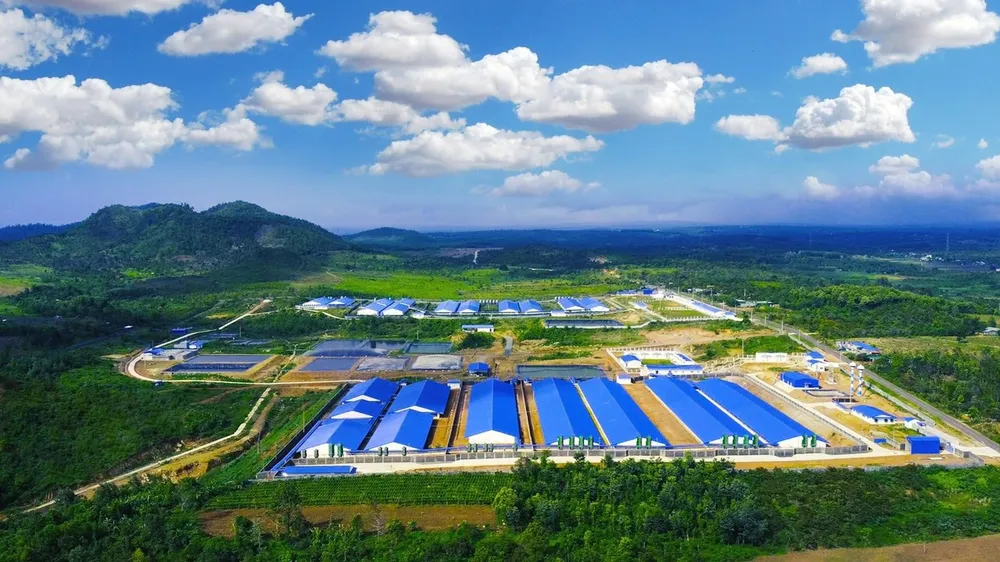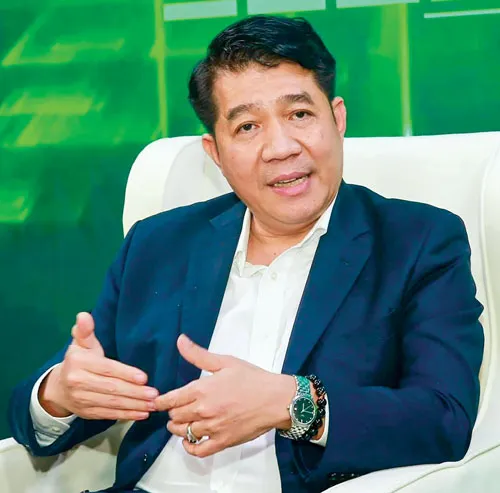
To shed light on this topic, Saigon Investment has engaged in discussions with Mr. Vu Manh Hung (pictured), Chairman of the Board of Directors of Hung Nhon Group, and Mr. Gabor Fluit (pictured), General Director for Asia of De Heus Group (Netherlands).
REPORTER: - As a leading global agricultural corporation currently operating in over 100 countries, how do you assess Vietnam's agricultural sector?
Mr. GABOR FLUIT: - Vietnam is fundamentally an agricultural nation, boasting a diverse range of domestically produced goods, including rice, meat, fish, eggs, milk, vegetables, and fruits. Despite the robust development of industrial sectors and rapid growth in service industries, tourism, banking, and finance in recent decades, agriculture remains the cornerstone of Vietnam's economy.

The sector employs a significant portion of the labor force. Particularly in times of global instability, countries like Vietnam, which are self-sufficient in food production, demonstrate their resilience in ensuring food security.
With Vietnam's agricultural, forestry, and fishery export value surpassing 53 billion USD in 2023, which is quite substantial, there is still ample room for growth. By moving in the right direction - increasing the value of products, reducing reliance on raw exports, and enhancing deep processing - Vietnam can certainly double its export turnover. Achieving agricultural product exports worth 100 billion USD is entirely feasible.
REPORTER: - So, what policies do you think enterprises in this field need to realize the potential of agriculture, especially the supply chain model?
Mr. GABOR FLUIT: - In my opinion, Vietnam has great potential for long-term success in agriculture. However, to fully realize this potential, Vietnam must prioritize the development of brands and supply chains. Despite the unpredictable nature of the global market, there are still promising opportunities for agricultural exports, and Vietnam's agriculture sector will continue to thrive.
The livestock supply chain model requires coordination, transparency, and strict adherence to the requirements of a genuine agricultural value chain. This model is being actively pursued by many large enterprises in the agricultural sector, particularly those with a strong commitment to green development.
REPORTER: - It is known that Hung Nhon is cooperating with De Heus on the supply chain model. So, Mr. Vu Manh Hung can introduce an overview of this supply chain model?
Mr. VŨ MẠNH HÙNG: - Certainly. The Hung Nhon - De Heus supply chain is structured around two key players: De Heus and Hung Nhon, along with their subsidiaries, to establish a closed-loop circular model. This model, often referred to as "from farm to table," aims to ensure sustainability and traceability throughout the entire supply chain.

De Heus is a global leader in animal nutrition, focusing on sustainable production and breeding practices, while Hung Nhon is an agricultural group specializing in large-scale livestock breeding, leveraging advanced technologies.
Additionally, our subsidiaries include Belga, a producer of one-day-old broiler and layer chicks and high-quality hatching eggs; Green Chicken, a Halal-certified slaughter and export processing enterprise; Visakan, specializing in the production and trading of veterinary and aquaculture drugs, as well as biological preparations; and Tien Nong, a producer of high-quality fertilizers.
Together, these entities form a comprehensive and sustainable supply chain model, representing a significant step towards green economic development in the agricultural sector.
REPORTER: - Mr. Gabor Fluit, why did De Heus choose Hung Nhon for its projects in Vietnam?
Mr. GABOR FLUIT: - De Heus selected Hung Nhon as its partner in Vietnam based on a Memorandum of Understanding (MoU) signed between the two entities during Prime Minister Pham Minh Chinh's visit to the Kingdom of the Netherlands on December 12, 2022.
This MoU outlined a comprehensive cooperation and strategic partnership between De Heus and Hung Nhon, focusing on the development of a high-tech livestock value chain from 2022 to 2030.
Under this agreement, Hung Nhon committed to investing in the construction of large-scale livestock farms adhering to international standards, while De Heus pledged to supply quality breeding pigs and chickens meeting global standards to these farms.
By 2030, the partnership aims to achieve significant milestones, including a capacity of approximately 7,500 breeding pigs in the Central Highlands region, 30,000 commercial sows in the Southeast, South Central, and Central Highlands regions, as well as the production of 58 million chicks and 25 million broilers in Tay Ninh. The anticipated total revenue from these endeavors is estimated to reach around 2 billion USD annually.
REPORTER: - Mr. Vũ Mạnh Hùng, can you share your experience with domestic enterprises that have and are intending to "shake hands" with foreign partners?
Mr. VŨ MẠNH HÙNG: - Our philosophy revolves around the idea that "if you want to go fast, go alone; if you want to go far, go together." Given the relatively small capacity of most Vietnamese enterprises, we recognize the necessity of aligning ourselves with larger partners to advance.
While such partnerships entail mutual benefits, our focus remains on fostering win-win cooperation rather than hierarchical dominance. Central to this approach is establishing a harmonious system that balances the interests of all stakeholders. When collaborating with industry giants, it's imperative to adopt a long-term perspective spanning 10 to 20 years, rather than solely focusing on immediate gains.
REPORTER: - Thank you both.




















